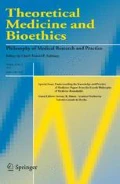Abstract
Nondirective genetic counseling developed as a means of promoting informed and independent decision-making. To the extent that it minimizes risks of coercion, this counseling approach effectively respects client autonomy. However, it also permits clients to make partially informed, poorly reasoned or ethically questionable choices, and denies counselors a means of demonstrating accountability for the use of their services. These practical and ethical tensions result from an excessive focus on noncoercion while neglecting the contribution of adequate information and deliberative competence to autonomous decision-making. A counseling approach that emphasizes the role of deliberation may more reliably produce thoroughly reasoned decisions. In such an approach, characterized by dialogue, counselors are responsible for ensuring that decisions are fully informed and carefully deliberated. Counseling remains nonprescriptive, but in the course of discussion counselors may introduce unsolicited information and/or challenge what they believe are questionable choices. By this means clients can be better assured that the decisions they make are fully considered, while counselors demonstrate a limited degree of professional accountability.
Similar content being viewed by others
REFERENCES
Rapp R. Chromosomes and communication: the discourse of genetic counseling. Medical Anthropology Quarterly 1980; 2: 143-157.
Lippman A, Wilfond BS. Twice-told tales: stories about genetic disorders. American Journal of Human Genetics 1992; 51: 936-937.
Brunger F, Lippman A. Resistance and adherence to the norms of genetic counseling. Journal of Genetic Counseling 1995; 4: 151-167.
Burke BM. Genetic counselor attitudes toward fetal sex identification and selective abortion. Social Science and Medicine 1992; 34: 1263-1269.
Andrews LB, Fullarton JE, Holtzman NA, Motulsky AG, eds. Assessing Genetic Risks: Implications for Health and Social Policy. Washington D.C.: National Academy Press, 1994: 149.
Michie S, Marteau T. Genetic counseling: some issues of theory and practice. In: Marteau T, Richards M, eds. The Troubled Helix: Social and Psychological Implications of the New Human Genetics. Cambridge: Cambridge University Press, 1996: 104-122.
Rogers CR. Client Centered Therapy, Boston: Houghton Mifflin, 1951.
Sorenson J. What we still don't know about genetic screening and counseling. In: Annas GJ, Elias S, eds. Gene Mapping: Using Law and Ethics as Guides. New York: Oxford University Press, 1992: 203-212.
National Society of Genetic Counselors. Code of Ethics. In: Bartels DM, LeRoy BS, Caplan AL, eds. Prescribing Our Future: Ethical Challenges in Prenatal Counseling. New York: Aldine de Gruyter, 1993: 169-171.
Kessler S. Process issues in genetic counseling. Birth Defects: Original Article Series 1992; 28: 1-10.
Kessler S. Psychological aspects of genetic counseling: VI. A critical review of the literature dealing with education and reproduction. American Journal of Medical Genetics, 1989; 34: 340-353.
Wertz DC, Sorenson JR, Heeren TC. Genetic counseling and reproductive uncertainty. American Journal of Medical Genetics 1984; 18: 79-88.
Zorzi G, Thurman SK, Kistenmacher ML. Importance and adequacy of genetic counseling information: impressions of parents with Down's Syndrome children. Mental Retardation 1980; 18: 255-257.
Shiloh S, Avdor O, Goodman RM. Satisfaction with genetic counseling: dimensions and measurement. American Journal of Medical Genetics 1990; 37: 522-529.
Frets PG, Niermeijer MF. Reproductive planning after genetic counseling: a perspective from the last decade. Clinical Genetics 1990; 38: 295-306.
Lippman-Hand A, Fraser FC. Genetic counseling — the postcounseling period: I. Parents' perceptions of uncertainty. American Journal of Medical Genetics 1979; 4: 51-71.
Furu T, Kaarlainen H, Sankila E-M, Norio R. Attitudes towards prenatal diagnosis and selective abortion among patients with retinitis pigmentosa or choriodema as well as among their relatives. Genetics and Society 1993; 43: 160-165.
Wertz DC, Sorenson JR, Heeren TC. Clients' interpretation of risks provided in genetic counseling. American Journal of Human Genetics 1986; 39: 253-264.
Frets PG, Duivenvoorden HJ, Verhage F, Niermeijer MF, van deBerge SMM, Galjaard H. Factors influencing the reproductive decision after genetic counseling. American Journal of Medical Genetics 1990; 35: 496-502.
Ekwo EE, Kim JO, Gosselink CA. Parental perceptions of the burden of genetic disease. American Journal of Medical Genetics 1987; 28: 955-963.
Lippman-Hand A, Fraser FC. Genetic counseling — the postcounseling period: II. Making reproductive choices. American Journal of Medical Genetics 1979; 4: 73-87.
Beauchamp TL, Childress JF. Principles of Biomedical Ethics, New York: Oxford University Press, 1989: 83.
Miller BL. Autonomy and the refusal of lifesaving treatment. Hastings Center Report 1981; 4: 22-28.
Brody H. The Healer's Power. New Haven: Yale University Press, 1992: 51.
Author information
Authors and Affiliations
Rights and permissions
About this article
Cite this article
White, M.T. Decision-Making Through Dialogue: Reconfiguring Autonomy in Genetic Counseling. Theor Med Bioeth 19, 5–19 (1998). https://doi.org/10.1023/A:1009976119490
Issue Date:
DOI: https://doi.org/10.1023/A:1009976119490




